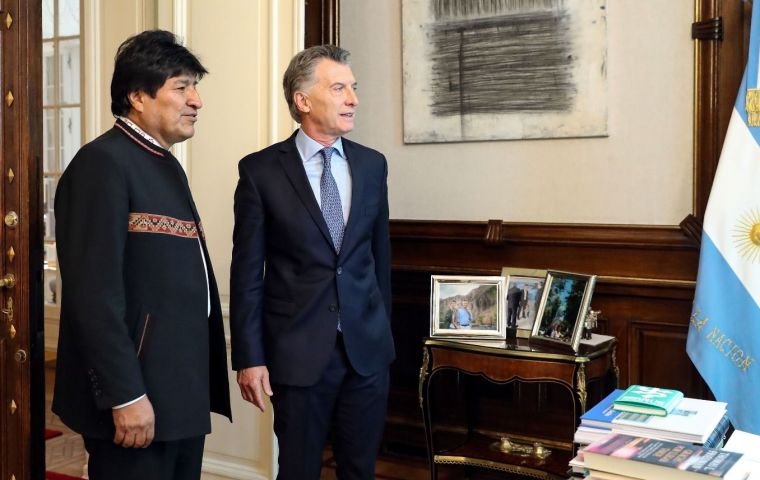MercoPress. South Atlantic News Agency
Bolivia considering exporting natural gas from liquefaction terminals in Argentina
 Morales discussed the plans with his counterpart, Mauricio Macri, in Buenos Aires, where they also touched on other proposals to widen energy integration.
Morales discussed the plans with his counterpart, Mauricio Macri, in Buenos Aires, where they also touched on other proposals to widen energy integration. Bolivia is looking at exporting natural gas globally through liquefaction terminals to be built in Argentina, and to buy crude from its southern neighbor, Bolivian President Evo Morales said on Monday, a move that would compensate for dwindling sales of its main export to Argentina and Brazil.
Morales discussed the plans with his Argentine counterpart, Mauricio Macri, in Buenos Aires, where they also touched on other proposals to widen energy integration.
In a press conference, Morales said they agreed that Bolivia's state-owned energy company YPFB “will participate in investments” to build liquefaction terminals to export LNG from Argentina.
This is key for Bolivia to sustain exports of gas, a main driver of economic activity and source of dollar inflows and tax revenue. Bolivia has seen a decline in sales. Argentina negotiated February to buy less from Bolivia, which supplied an average of 16.9 million cubic meters a day in 2018, down from 18.8 million cu m/d in 2017, according to Argentina's Energy Secretariat data.
In 2019 and 2020, Bolivia agreed to deliver 11 million cu m/d in the warmer months of October through April and 16 million-18 million cu m/d during the colder months, when residential demand surges in Argentina. The deal is part of Argentina's efforts to expand sales of gas from Vaca Muerta, one of the world's largest shale plays.
Argentina has been stepping up sales to Brazil, Chile, and Uruguay as its production from the play surges. Output from the play shot up 169% year on year to 31 million cu m/d in February, pushing up total production 7.9% to 135 million cu m/d, the latest numbers from the Energy Secretariat show.
The secretariat has estimated that production could double to 260 million cu m/d in 2023, meaning that it must find new markets for additional supplies.
As part of this, Argentina has been shaving total gas imports, which tumbled 15.7% to 26.9 million cu m/d in 2018 year on year. It ended a contract for one of its two regasification terminals last year.
With Vaca Muerta holding the world's second-largest shale gas resources, this means Bolivia faces a steady decline in sales to one of its only two markets.
Bolivia has looked at opportunities to sell more gas to Brazil, its other main buyer. But that market isn't seeing much growth in its gas demand, and its own production is growing from offshore fields. Other options to sell to Paraguay and Uruguay would require huge investments in pipelines, but demand is limited in those markets.
This has shifted Bolivia's focus to exporting LNG through Argentina to make use of the pipeline infrastructure it has in place to deliver supplies there. Indeed, as part of the agreement with Argentina, Morales said YPFB will be able to sell gas directly to customers in Argentina and also invest in upstream projects in Argentina.
Argentina is already taking steps to export LNG for the first time. YPF, the country's state-backed energy company, plans to start shipping 2.5 million cu m/d in the second half of this year through a FLNG, and is drawing up plans for an onshore liquefaction terminal.
As part of the agreement, Bolivia said it plans to buy oil and petroleum products from Argentina in the future, tapping into rising output from Vaca Muerta. Argentina is on track to start exporting light crude from the play in the second half of this year as production increases. Output is expected to double to 1 million b/d in 2023, which will make 500,000 b/d available for export.




Top Comments
Disclaimer & comment rulesCommenting for this story is now closed.
If you have a Facebook account, become a fan and comment on our Facebook Page!